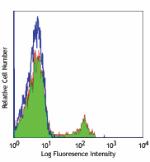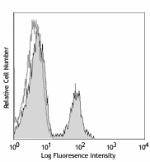- Clone
- 3F3 (See other available formats)
- Regulatory Status
- RUO
- Workshop
- VI CD72.1
- Other Names
- Lyb-2, Ly-19.2, Ly-32.2
- Isotype
- Mouse IgG2b, κ
- Barcode Sequence
- CAGTCGTGGTAGATA
- Ave. Rating
- Submit a Review
| Cat # | Size | Price | Quantity Check Availability | Save | ||
|---|---|---|---|---|---|---|
| 316215 | 10 µg | 287€ | ||||
CD72 is a 39-43 kD type II membrane glycoprotein. It is a disulfide-linked homodimer belonging to C-type lectin family. CD72 is a pan-B cell marker expressed on pre-pre-B cells throughout B cell differentiation with the exception of plasma cells. It is also expressed on follicular dendritic cells, splenic red pulp macrophages (but not on peripheral blood monocytes), and liver Kupffer cells. CD72, a negative coreceptor of B cells, contains immunoreceptor tyrosine-based inhibitory motifs in the cytoplasmic domain which has been shown to recruit the tyrosine phosphatase SHP-1. Ligation of CD72 with its ligand regulates CD72 tyrosine dephosphorylation and SHP-1 dissociation to promote B cell activation and proliferation. CD100 and CD5 have been shown to be CD72 ligands. The CD100-CD72 interaction plays a role in maintenance of B cell homeostasis.
Product DetailsProduct Details
- Verified Reactivity
- Human
- Antibody Type
- Monoclonal
- Host Species
- Mouse
- Immunogen
- Human lymphocytes
- Formulation
- Phosphate-buffered solution, pH 7.2, containing 0.09% sodium azide and EDTA
- Preparation
- The antibody was purified by chromatography and conjugated with TotalSeq™-D oligomer under optimal conditions.
- Concentration
- 0.5 mg/mL
- Storage & Handling
- The antibody solution should be stored undiluted between 2°C and 8°C. Do not freeze.
- Application
-
PG - Quality tested
- Recommended Usage
-
Each lot of this antibody is quality control tested by immunofluorescent staining with flow cytometric analysis and the oligomer sequence is confirmed by sequencing. TotalSeq™-D antibodies are compatible with Mission Bio’s Tapestri Single-Cell Sequencing Platform for simultaneous detection of DNA and Protein.
To maximize performance, it is strongly recommended that the reagent be titrated for each application, and that you centrifuge the antibody dilution before adding to the cells at 14,000xg at 2 - 8°C for 10 minutes. Carefully pipette out the liquid avoiding the bottom of the tube and add to the cell suspension. For Proteogenomics analysis, the suggested starting amount of this reagent for titration is ≤ 1.0 µg per million cells in 100 µL volume. Refer to the corresponding TotalSeq™ protocol for specific staining instructions.
Buyer is solely responsible for determining whether Buyer has all intellectual property rights that are necessary for Buyer's intended uses of the BioLegend TotalSeq™ products. For example, for any technology platform Buyer uses with TotalSeq™, it is Buyer's sole responsibility to determine whether it has all necessary third party intellectual property rights to use that platform and TotalSeq™ with that platform. - Application Notes
-
Additional reported applications (for the relevant formats) include: immunoprecipitation.
- Additional Product Notes
-
TotalSeq™-D reagents are designed to profile protein expression at single cell level. The Mission Bio Tapestri platform and sequencer (e.g. Illumina analyzers) are required. Please contact technical support for more information, or visit biolegend.com/totalseq/single-cell-dna
The barcode flanking sequences are CGAGATGACTACGCTACTCATGG (PCR handle), and GAGCCGATCTAGTATCTCAGT*C*G (capture sequence). * indicates a phosphorothioated bond, to prevent nuclease degradation.
View more applications data for this product in our Application Technical Notes. - Application References
-
- Knapp W, et al. Eds. 1989. Leucocyte Typing IV. Oxford University Press. New York.
- RRID
-
AB_2924532 (BioLegend Cat. No. 316215)
Antigen Details
- Structure
- Type II membrane glycoprotein, C-type lectin family, 39-43 kD, homodimer
- Distribution
-
Pre-pre-B cells throughout B cells differentiation (but not on plasma cells), follicular dendritic cells, splenic red pulp macrophages, liver Kupffer cells
- Function
- negative regulation of B cell receptor signaling
- Ligand/Receptor
- CD5, CD100/Sema4D
- Cell Type
- B cells, Dendritic cells
- Biology Area
- Immunology
- Molecular Family
- CD Molecules
- Antigen References
-
- Knapp W, et al. Eds. 1989. Leucocyte Typing IV. Oxford University Press. New York.
- Schwarting T, et al. 1992. Am. J. Hematol. 41:151.
- Wu HJ and S. Bondata. 2002. Immunol. Res. 25:155.
- Kumanogoh A, et al. 2000. Immunity 13:621.
- Parnes JR and C. Pan. 2000. Immunol. Rev. 176:75.
- Kumanogoh A, et al. 2005. Intnl. Immunol. 17:1277.
- Gene ID
- 971 View all products for this Gene ID
- UniProt
- View information about CD72 on UniProt.org
Related Pages & Pathways
Pages
Related FAQs
Other Formats
View All CD72 Reagents Request Custom Conjugation| Description | Clone | Applications |
|---|---|---|
| Purified anti-human CD72 | 3F3 | FC,IP |
| FITC anti-human CD72 | 3F3 | FC |
| TotalSeq™-A0419 anti-human CD72 | 3F3 | PG |
| APC anti-human CD72 | 3F3 | FC |
| PE anti-human CD72 | 3F3 | FC |
| TotalSeq™-C0419 anti-human CD72 | 3F3 | PG |
| TotalSeq™-B0419 anti-human CD72 Antibody | 3F3 | PG |
| TotalSeq™-D0419 anti-human CD72 | 3F3 | PG |
| Pacific Blue™ anti-human CD72 | 3F3 | FC |
Compare Data Across All Formats
This data display is provided for general comparisons between formats.
Your actual data may vary due to variations in samples, target cells, instruments and their settings, staining conditions, and other factors.
If you need assistance with selecting the best format contact our expert technical support team.
-
Purified anti-human CD72

Human peripheral blood lymphocytes stained with purified 3F3... -
FITC anti-human CD72

Human peripheral blood lymphocytes stained with 3F3 FITC -
TotalSeq™-A0419 anti-human CD72
-
APC anti-human CD72

Human peripheral blood lymphocytes were stained with CD19 FI... -
PE anti-human CD72

Human peripheral blood lymphocytes were stained with CD19 FI... -
TotalSeq™-C0419 anti-human CD72
-
TotalSeq™-B0419 anti-human CD72 Antibody
-
TotalSeq™-D0419 anti-human CD72
-
Pacific Blue™ anti-human CD72

Human peripheral blood lymphocytes were stained with anti-hu...

 Login / Register
Login / Register 

















Follow Us